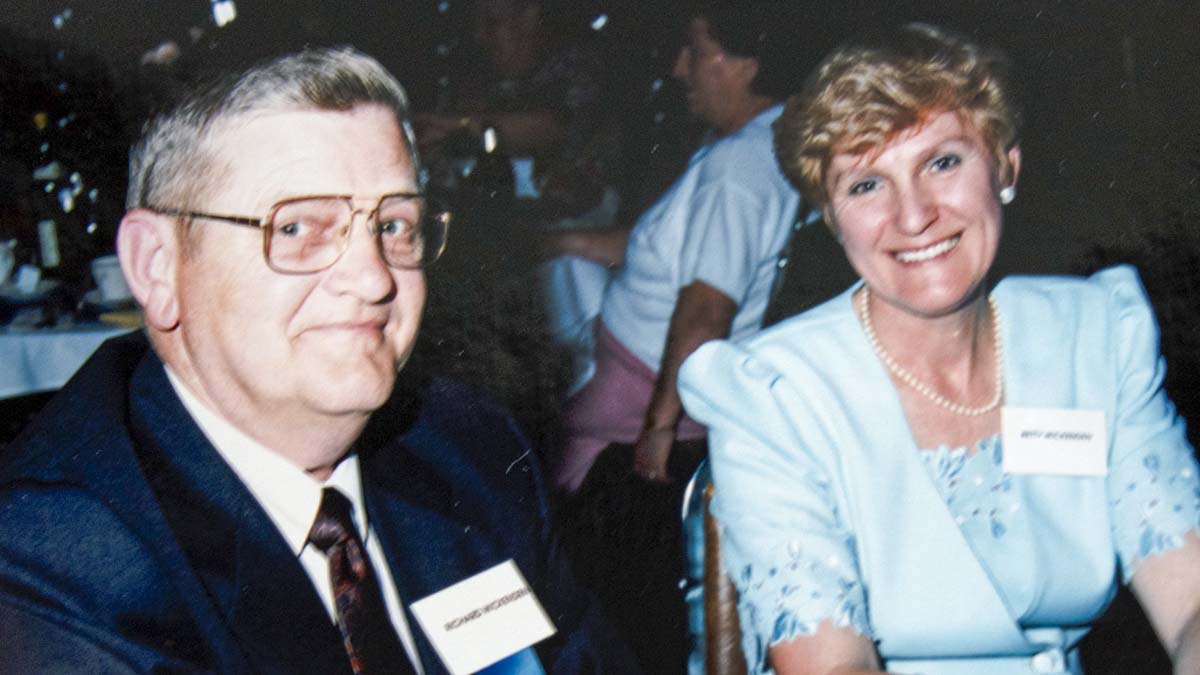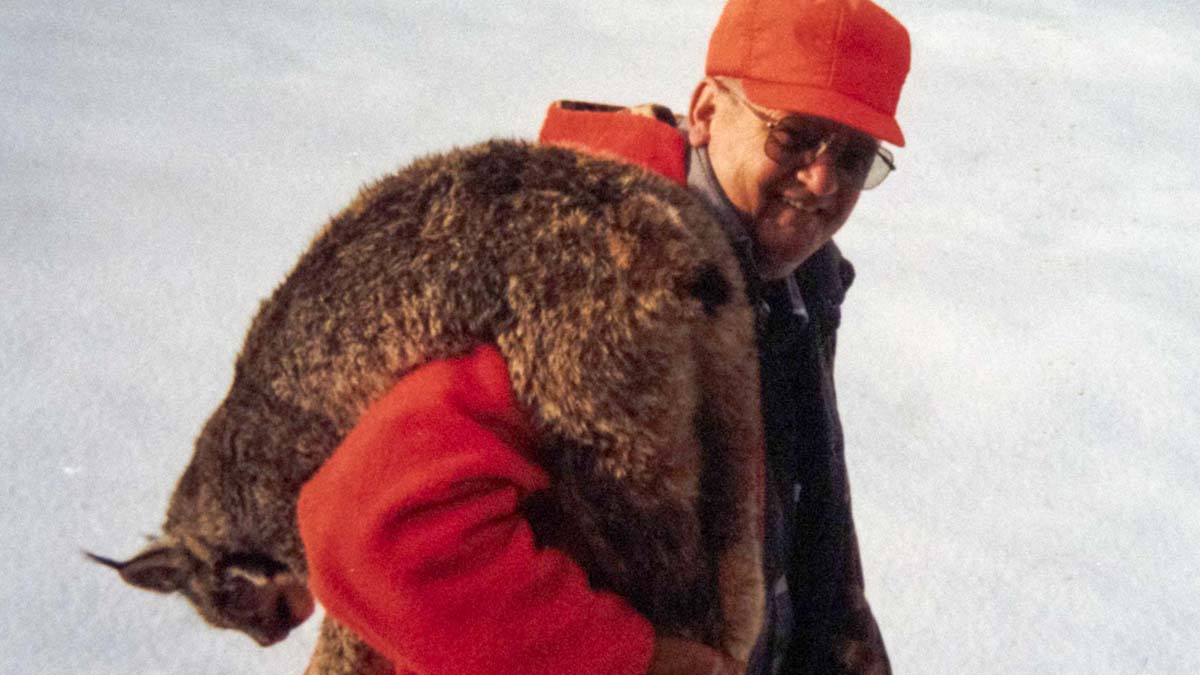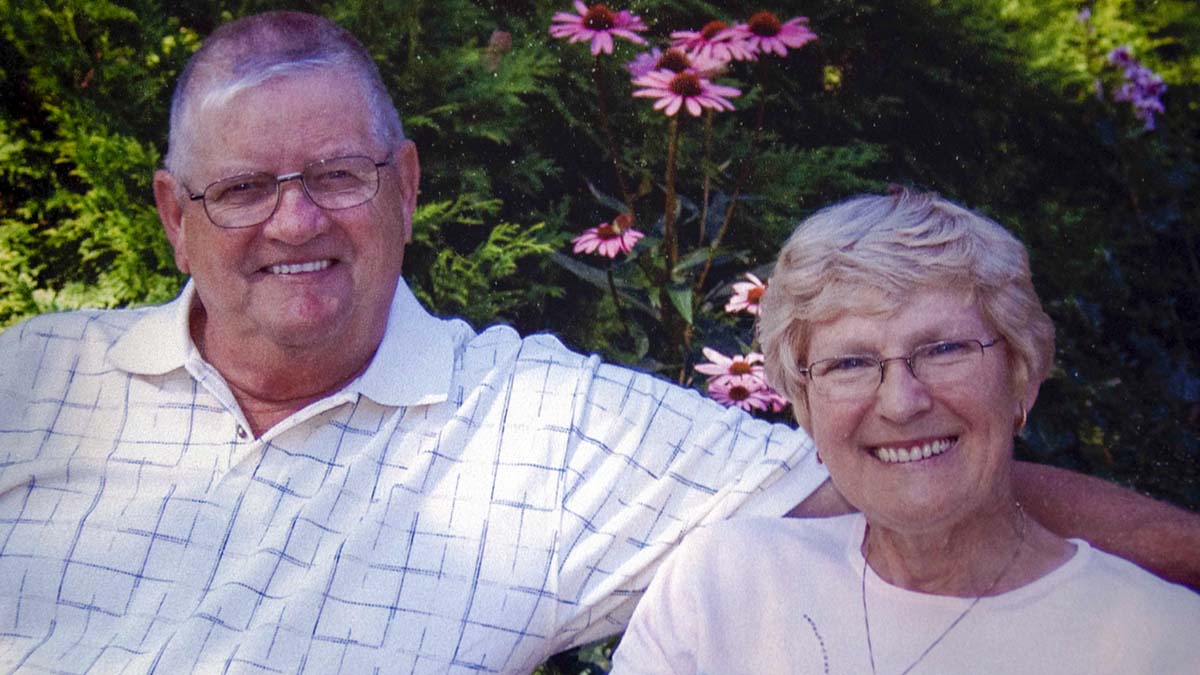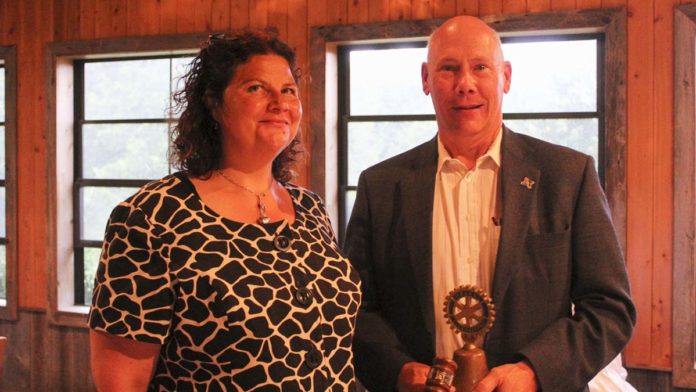by Petra Wall
Dick is enjoying an eventful, productive life, one that included quality family interaction and his mainstay career of firefighting and prevention training. He and wife Betty also shared many interests ranging from volunteer work to raising two talented offspring. Dick’s early career was as a linesman for Bell Telephone in Sudbury, where he met Betty. In their retirement years, they both called Manitoulin home.
“When I was a child in Sudbury, the three whistles at Inco kept me focused. For me, the first whistle at 12 pm was for lunch; the second at four in the afternoon signaled quitting time for many workers and heads up for me. The last one, an hour later, meant a shift change. When that last whistle went, we were to be home, our hands washed, hair combed and sitting at the dinner table or face the consequences. I only broke that rule a couple of times. Each time I found my food plate sitting cold on the counter, not to be consumed until everyone else had finished. Further penalties included a lengthy restriction to the back yard.”

“Paternal grandparents William and Sarah (McNabb) Wickenden were the first of our family to live on Manitoulin, in Little Current. William worked for the ACR, the Algoma Central Railway. My father George was only three years old when his father died. William and his crew were trying to get water for the train at Victoria Mines but ran into an impending cave-in on the tracks. The train kept going. The accident happened at the next stop, Crane Hill Mine, when a steamline broke and he was fatally injured. The train was delivering a load of coal to Sudbury. Not long after the funeral, Grandmother Sarah moved her children to Sudbury.”
Maternal grandparents Theodor and Melanie (Arsenault) Fallu originated from the Gaspe area and settled on a small farm in Blind River. “I liked visiting the farm. Grandfather knew a drover who took care of an enormous number of horses, filling seven barns at his home. Each winter, these horses were in the bush, transporting logs for the lumber trade. Summers found them in Blind River where they were safe from the threat of forest fires. They could also see the veterinarian if necessary. After breakfast with the drover, I would join him on a buckboard loaded with bundles of hay. It was my job to cut the binding twine on each bundle.”
Richard Charles, ‘Dick,’ was born on July 1, 1939, to George and Alice Wickenden. “I formed a country and started a war,” Dick injects with a smile. “My mother was quite upset with the timing of my birth because the Queen was going to visit Sudbury that very day and mother could not go because she was in labour at St. Joseph’s Hospital. She was a dedicated Royalist and named all of us after that prestigious family in England. I was Richard. My sister was named Elizabeth (Betty) Ann and my younger brother was Donald Albert. We lived off Yonge Street, in the old part of Sudbury at first, and later we moved to the city’s southwest side.”
Dick liked to wander away, so his parents had to keep a close eye on him. “We did not have a front yard, and I was an explorer. As soon as I was old enough, I earned a free hand to come and go as I pleased. Hiking a little further was tempting, but I had to heed the second whistle at Inco to ensure my timely return for supper before the third whistle. Our French school, St. Aloysius de Gonzague, consisted of eight classrooms. It was situated behind St. Joseph’s Hospital. Grade 6 brought us to the St. Albert School. I liked geography and history the most. Our past read like a good storybook to me.”
“We did not have many family trips. I do remember renewing family ties at Christmas. We would go tobogganing on the Lions Club Hill on Elm Street. There was also a big sand pit there and a nearby skating rink, maintained by the city.” Dick’s designated high school of Lockerby had burned down so Dick attended St. Charles’ College in Sudbury. He added French and Latin to his favourites list. “Math was my least favourite. Latin did not seem useful, but later it helped me out in Spain and Portugal. St. Charles College hosted varsity football and hockey teams but I would have preferred to attend a vocational school instead and become a cartographer. I was later discouraged to discover that satellites could do that job quite well.”
“My dad had been an employee at Inco, and he hoped I would not work there too. When school finished, I joined Bell Canada, as a linesman. That was when I met Betty at her house. She was planning to meet my buddy but she got me instead. We all had an enjoyable time, sitting in front of a campfire and dancing on the flat area that hosted a hockey rink each winter. Eighteen days after I met Betty, my belle of the ball, I had a ring on her finger. She was such a sweetheart. I instinctively knew she was the one for me.”
“Betty was from the small town of Chapleau and had started working at Bell Canada there as a long-distance operator when she was 15 years old. Her mom had helped her get the job. We dated for a while, but both of us knew we were destined to be man and wife. In 1958, I worked in Chapleau for three months. Betty’s dad, a yard foreman there, ran the train yard. We were married early on the morning of August 15, 1960. The reception was at the Legion Hall. We had to catch the train the same day for our honeymoon. After the trip, we moved back to Sudbury. Betty was promoted to supervisor of her department at Bell Canada, and continued there for many years, stopping only when our children, David and Mary Lynn, were born. I continued as linesman.”
“While with Bell Canada, we replaced the lines between Espanola and Gore Bay. It was a big job and people were happy to see the new lines go in. I remember watching that iconic movie ‘Bridge Over the River Kwai’ at that time. That classic movie was the best entertainment that year and left a lasting impression on me. I came to understand more clearly what happened in that period of the war.”

“Betty was now training staff for an engineering department for Bell. Eventually, I quit working for Bell and was hired by the city of Sudbury as a firefighter. I could spend more time with my family. With Betty’s 12 siblings, we always had big family reunions. Her relatives would arrive from distant locations to attend these special get-togethers.”
After Dick graduated from the Ontario Fire College, he took technical fire and officer training. He loved the work. “I fastidiously studied each piece of equipment and then shared the knowledge with new recruits in many locations. Movies like ‘Towering Inferno’ with Paul Newman and Steve McQueen do not reflect the true nature of firefighting, but they are interesting to watch. Firefighters do run in when others run out. Dynamite and scaling buildings may be more common today, but they were not part of the arsenal we used. They do add drama to a movie.”
Dick recalls one fire where he was on his stomach on the floor of a burning building when the hose was turned on. “I anticipated water spraying hard from the nozzle, but I did not expect to slide backwards quite so quickly on the floor. The waxy surface had melted. Nevertheless, the fire was put out and nobody was hurt. I was not involved with too many rescues of people from fires, although we always searched for people first. I do remember one lady who needed CPR which I provided; thankfully, she lived. Most of my rescues involved car accidents, getting people out of automobiles.”
“We lived in Sudbury, but our vacations were on Manitoulin. We spent 14 years, from 1971 to 1985, summering at Stanley Park, often visiting our trailer set up there. We also used the trailer to see both Canadian coastlines and many more places. Betty started skiing at 40, and she loved it. The most challenging location was Mt. St. Ann in Quebec where the ‘Crazy Kanucks’ skied. It is all black diamond runs.”

“I am proud to say son David also became a firefighter, graduating from Ryerson and the Fire College. He was later promoted to deputy fire chief. He is also an established writer and artist. David laughingly refers to himself as an ‘artistic arsonist.’ His painting of Jean Chrétien is hanging in Rideau Hall. He burned into wood a poignant photo of President Bush and a firefighter at the 9-11 site, a photo David had taken from his television screen. David also painted a photo published in the Sudbury Star of his dad and Arnold Sitko fighting the fire of a furniture store in Sudbury. This painting was later made into a celebratory coin by the fire department.”
“That beautiful loon on my shelf was carved by David. Like me, he enjoys fishing. He won an award from the Ontario Federation of Anglers and Hunters in the 1980s. David has three boys, Adam, a diesel mechanic in Copper Cliff; Daniel, a college graduate in finance and business administration who plans to return to school this fall and Ian, a carpentry apprentice who is helping to build a nursing home behind St. Joseph’s Hospital.”
“Daughter Mary Lynn attended Cambrian College and went into animal husbandry. She travelled extensively with the Sea Cadet band, attending noted events like the Grey Cup. She always had two part-time jobs. As a petty officer, she was teaching young service members how to shoot in British Columbia. Animal welfare has also been an attraction for her. The sailboat she was gifted after she graduated from Cambrian was soon traded for a horse.”
“Mary Lynn and Mike Sheridan own an apple orchard in Clarksburg. They also manage properties for other owners. The couple has three children. Cheryl, who taught a beluga whale how to paint at Sea World and has set up exhibits in places like Science North, San Francisco, San Diego and Vancouver. She also worked in Africa for a while. Julianne and Ethan Higginson own 75 red and black Angus cattle on a ranch outside of Meaford. Grant, the third offspring, is an electrician apprentice, earning his license this fall.”
“I retired from the fire department in 1994, after 32 years. The following year, we moved permanently to Manitoulin. Our house on top of Dryden’s Lane on Lake Manitou had just been finished. Betty started to grow one of the nicest gardens in the area. We had purchased the property about 10 years earlier, in 1985. I was seconded as an instructor for the fire departments on the Island and was training firefighters. I also created a list of clients who need fire extinguisher services and happily worked part time for them. Unfortunately, when I was ready to leave the extinguisher business, I could not find a taker, even when offering to give it away.” Dick also trapped on Manitoulin for about eight years. “I sold the furs to North American Furs a company in Toronto. A good fisher fur could bring in over $100.”

“Betty was a volunteer’s volunteer. She would do so much for others. She provided her services at the Manitoulin Health Centre, doing hair and nails for the patients waiting to get into long term care. She helped start the palliative care units that are in both Mindemoya and Little Current hospitals. She made prayer shawls for the patients and encouraged other volunteers to make more. Betty was on the Ladies’ Auxiliary too. Like me, she needed to keep busy.”
“Both Betty and I volunteered for the Journey to Bethlehem, serving coffee and hot chocolate. Afterwards, we helped clean the church. For special occasions, Betty and I loved to attend the plays at the community centre in Gore Bay. Travelling was on the agenda too. We had lots of plans to visit different parts of Canada and the world. Four years ago, we moved to the senior apartments in Mindemoya and sold our Lake Manitou home. We had a big garage sale. I sold all my tools, collected from over 60 years of salvage and carpentry work.”
“As for my birth family, my younger brother Donald became a salesperson for Labatt’s, then Dupont before finally working for a company that built air exchangers. Sister Betty Robertson Reaume was a registered nurse who worked for the Sudbury District Health Unit. She became known as the ‘needle lady’ from all the immunizations she did in Sudbury and on Manitoulin. She lived in Chelmsford and ran for the Liberal Party at one point. We lost her in 1996.”
“Fondest memories? The impressive achievements of our children. As mentioned, my son is a deputy fire chief and a fine artist. My daughter traveled and trained military students before running a successful apple orchard with her husband. Favourite pets? Boots, our mouser cat, with four white feet. We had to give her away when I became allergic to cats. We have had dogs too. Patches, our springer spaniel, also had to be rehomed. He needed a bigger property to run on. He was returned to us because he chased the squirrels the new owner was trying to feed. We found another owner who liked him because he chased the rabbits out of his yard.”
“Favourite season? I like all seasons. Each one has something good to offer. Favourite books? Historical fiction. ‘Sharpe’s Rifles’ by Bernard Cornwell is one of 20 in that series. Betty was interested in Acadian issues. Her ancestors were part of the Acadian Expulsion by the British from their homes in New Brunswick and Nova Scotia in the 17th century. They were relocated to many places including the southern USA. Son David is researching this part of their history and plans to author a book on the topic.”
Collections? “Stamps and old catalogues.
Favourite family holidays? “Manitoulin, specifically Stanley Park. We were the first to have a year-around rental site in the park, in the 1970s.”

Favourite television show? “NCIS.” Favourite sport? “Fastball. When we were working for the fire services, we merged our athletic pursuits with those of the OPP and played in a fastball league.”
First hourly wage? “Shoveling pig poop for 25 cents an hour on a pig farm near Sudbury, using my Model A car and trailer. I later sold that Model A car, purchased for $25, after I painted it with black tire paint to make it look good. I got $75 dollars for it.”
Awards? “A medal for long service with the fire department. My wife’s family introduced me to the Shrine in Montreal built for Brother Andre who is buried in a crypt there. His crypt is surrounded with many crutches and braces left by admirers. They awarded me a certificate for financial and devotional support.”
Strengths? “Firefighting, carpentry and building things. Stuff I would still like to do? Hunting and fishing. About 5,000 lake trout, alevins, were released off our dock into Lake Manitou about six years ago by the ministry. Betty was very impressed. I would still like to catch a speckled trout in Newfoundland or the Yukon. Associations I was involved with? President of the Sudbury Fish and Game Club. I belonged to IAFF, the North American International Association of Fire Fighters, and lastly, the Trapping Association of Canada, a Crown Corporation.”
“What am I proud of? My kids and my wife and the fact that I have survived as long as I have. Most afraid of? The state of the political world and the longevity of COVID.”
“If I could only keep three things from this life to live in a remote place, what would they be? Family photo album, my electronic reader (hopefully it would work) and a knife.”
“If I could go back in time, would I change anything? No. I would do it all again, but I would be wiser. I would never renovate an old home again. Buying a first home now is also more difficult than it was for us. I paid $14,000 for my first house in Sudbury five decades ago and paid $16,000 for a lot on Lake Manitou in 1985. Prices have increased exponentially since then.”
“People who inspired me? My parents. They were strict. Betty and I were strict also, but we all supported one another.”
Recipe for happiness? “Help everybody you can and do not be afraid to do so. It is rewarding for both you and the person you helped.”
Wise words for our youth? “Get out there and work.”
Current status? “I am waiting to go anywhere for an MRI. Apparently, the equipment in the North is booked well in advance, so I am heading south. I am happy here in my apartment with some precious mementos all around me. I have met and spent time with several other seniors that have migrated to this complex. It is a good community.”
“Manitoulin is a unique place. I fell in love with the people here and the scenery. The serenity of this part of the country which harbors only one traffic light getting on and off the bridge, is something to behold. I lost Betty two years ago, but both Betty and I had made some good friends over the years, and I am still happily enjoying their company. All you need to live comfortably on this Island you can get here on Manitoulin. You really do not have to leave if you do not want to.”




